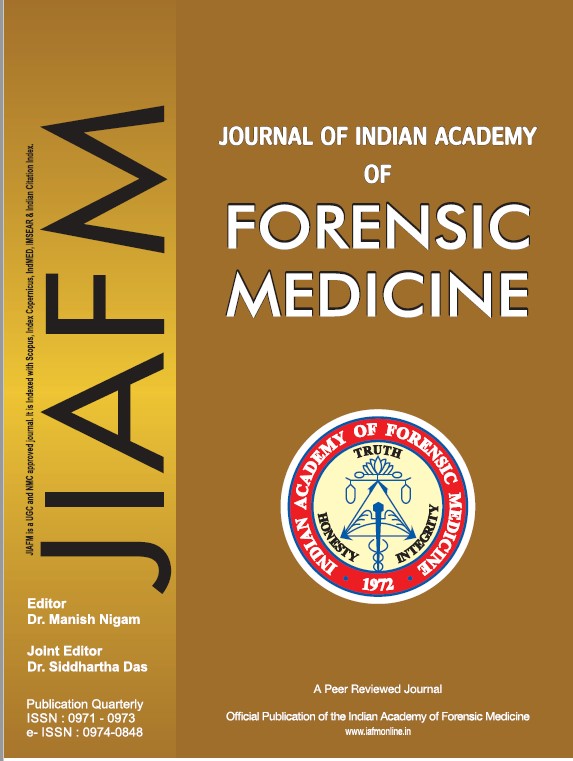Significance of Defence Wound in Homicidal Death
DOI:
https://doi.org/10.48165/Keywords:
Defence wound, Homicidal death, Post-mortem examinationAbstract
The present study was carried out prospectively on 111 homicidal victims coming for medico legal autopsy to the mortuary of SCB Medical College, Cuttack, Odisha from October 2010 to September 2012 to know the significance of defence wound by determining its incidence and pattern of wound. Out of the 111 homicidal deaths, 31 cases (27.92 %) were found with defence wound. Males were approximately 1.43 times more defensive than females. Most common age group showing defence wound was 21-30yr. Sharp weapon was used in 45.16% cases where as blunt weapon in 38.71% cases. Most common type of defence wound was incised wound (29%), followed by bruise (22.58%). Most common site involved in upper limb was forearm, followed by hand and arm. Active defence wound were found in 16.12% cases and passive defence wound in 64.51% cases. Left hand showed most defence wound (41.93%) as compared to bilateral hand involvement (32.25%) and right hand involvement (25.8%). A careful and thorough post-mortem examination of defence wound may give clues to the circumstances prior to death of the victim.
Downloads
References
Reddy K.S.N. The Essentials of Forensic Medicine & Toxicology;2012-31st Ed.:190-191
Knight B., Saukko P. – Forensic Pathology ;2004-3rd Ed:165, 166 3. Siegel Jay A., etal. Encyclopedia of Forensic Sciences;2000-vol 1:374-375
Sheikh M.I., Prajapati P., Kaushik V. Defence Wounds in Homicidal Deaths; JIAFM- 2009: 31 (1) : 18 – 21.
Patal D.J.- Analysis of Homicidal Death in and around Bastar region of Chattishgarh; JIAFM 2012-34(2); 139 – 142.
Mohanty M.K., Panigrahi M.K. et al- Self Defence Injuries in Homicidal Deaths; JFLM 2007: 14 (4): 213-215.
Hugar B.S., Harish S. Pattern of Injury in Homicidal Deaths; IIJFMT. 2010 – 8(2); 87-96.
Hugar B.S., Harish S. et al- Study of Defence Injuries in Homicidal Deaths- An Autopsy Study; JFLM 2012: 19(4): 207-210
Mohite P.M. et al – Autopsy Evaluation of Defence Wounds in Homicidal Death in Central India. JFR 2013: 4(5).
Chattopadhyay S., Sukul B. – Pattern of Defence Injuries among Homicidal Victims EJFSc. 2013., 3(3): 81- 84.
Katkici U., Ozkok M.S., Orsal M.- An Autopsy Evaluation of Defence Wounds in 195 Homicidal Deaths due to Stabbing; JFScSo. 1994: 34(4): 237-240.


